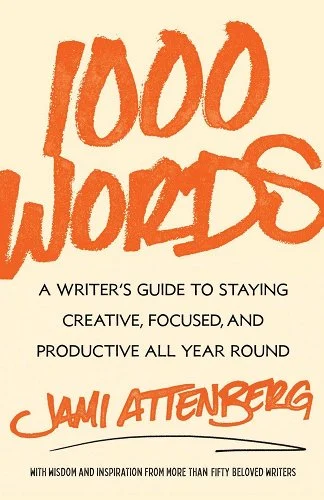interviews
Building a Writing Community On and Off the Internet
Jami Attenberg, author of the writer's guide "1000 Words," is making the literary world more accessible

Starting back in 2018, Jami Attenberg brought together writers on social media as a means of accountability. The philosophy of #1000wordsofsummer was to develop a daily writing practice of 1000 words because small increments seem doable and quickly accrue. Over 33,000 writers subscribe to her motivational newsletter connected to the hashtag. In her new book, 1000 Words: A Writer’s Guide to Staying Creative, Focused, and Productive All Year Round, Attenberg takes her highly successful #1000wordsofsummer to a new phrase as an anthology.
In this book version, she includes her words, the “letters” from other well-known writers, as well as occasional “notes” that include suggestions displayed on an image of a spiral notebook page. There is a progression based on seasons, but the anthology is also what I think of as a writing table book, something to leave on your desk so that you can flip it open to find a burst of inspiration.
Because 1000 Words includes Attenberg’s thoughts as well as the words of other successful authors from Alexander Chee to Mira Jacob and Elizabeth McCracken, it creates a sense of community—we’re all in this together trying to figure it out. Attenberg’s approach isn’t focused on prompts but instead employs a much more conversational style, discussing issues that her readers will confront as writers. Not only does she provide helpful insights, but she herself is a model to follow. Attenberg is a highly productive writer who has published six novels, a short story collection, essays, as well as a memoir, so who better to motivate other writers? In addition to the release of this book, her next novel, A Reason to See You Again, will be published later in the year.
Jami Attenberg and I recently spoke on Zoom about writing motivation, social media, and bringing people together.
Abby Manzella: I’ve been watching #1000wordsofsummer grow since I signed up in 2019, and I’m continually impressed with what you’ve been able to build both through social media and now with this book. For me, it was fun to read the book from start to finish to see the connections you were making between ideas, but there were points where I had to stop reading to write because what you were sharing was getting me to jot down ideas that wouldn’t wait. I know that the project began as some self-motivation and accountability, but what kept you going after it served that initial purpose for you?
Jami Attenberg: The first year everybody got so excited by it and really responded to it. Sometimes we just create jobs for ourselves. Sometimes we’re like, that is a thing that I could do—not a paid job, because that’s not what this is about—but it’s something where we can contribute and communicate and connect with people. It called on all the skills that I had, which is to reach out to people, be positive online, and access other people’s skills, too.
AM: Do you think that skill comes more from your article writing?
Sometimes we just create jobs for ourselves, something where we can contribute and communicate and connect with people.
JA: I’m thinking more about the community aspect of it. I have this background where I worked as a producer for online projects. When I started out, it was like everyone else was the creative person and I managed them, managed their schedule, until I realized that I wanted to be my own creative person. I think there is something about me that has that capability of helping people make their art. That’s part of it, and I’ve been online; I’ve had a blog off and on, since the late ’90s, so talking to people online is something I feel comfortable with.
AM: Since we’re living through an upheaval with social media, are you now thinking about engaging in those spaces differently?
JA: I’m finding that newsletters are actually an ok place to be. It was funny because it really started on Twitter—and a little bit on Instagram—but mainly on Twitter where the hashtag started. It was easier to find each other [then]. Everybody was still on it. Now people have gone to different places, but in terms of the literary world, it was a place. You’d have your morning coffee, get together, and chitchat, and then people would go about their day. Maybe they’d check in here or there. So, for me tweeting in the morning one day it sounded like a good idea, everyone chimed in. Now I feel like you can’t find people anymore.
When I send out the newsletter people read it. It used to be that I had to post it on Twitter and then people would know about it and things could go viral in that way. I don’t want to say I don’t need other forms of social media because I’ll take whatever I can get; I have a book coming out. [Still, the newsletter] is pretty consistently read. I mean it’s not 100% read, but it’s like 50% or 60%. That’s a lot for almost 35,000 people signed up for it—consistently every week. Is that a brag?
AM: No, it’s great. It makes me smile.
JA: It’s really nice.
AM: I was wondering at what point you figured out that 1000 Words was a book project? When did you decide you had to take it beyond the social media space and put it all together?
JA: It was a year ago summer, after I finished that round of #1000wordsofsummer, which would have been year five, and it felt big. We raised all this money for charity, and you could see the people on the Slack were doing it all times of day, meaning all over the world there was somebody who was writing and posting their word count. You could see people showing up, which was really cool, and I was like, is it a book? And then I thought, if it is a book, I need to figure it out now rather than later because if I write this book, I know I will have to keep doing #1000wordsofsummer for a while, so I was like, well let me think about it.
I want to create something that invites people in as opposed to keeping people out.
What happened was that I took all of the letters that had ever been written, I put them in by contributing authors, and I put them in a document. I needed to just read them all to see if something came out of this. I felt this surge of energy from it—not to be hippy dippy about it—but for real. Oh shit, there’s a lot going on here. All of these people have written books. All of these people have been through it, and they’re all telling me I can do it, and also they’re telling me that sometimes it’s hard to do it, and also that sometimes they feel like they can’t do it, but they have faith. There’s this incredible wave of energy that came off it, and I was like, man, I need to put these all in one place because it’s different reading them online than it would be reading it from cover to cover. But I thought, still, is it a book? I don’t want this to just be an anthology of these letters because I don’t think that’s enough. I felt like my voice needed to be a part of it, too.
Those letters told me how to write the book because they weren’t all about the season of summer being wildly generative, because I could see all the struggles they had or different parts of their processes, and I knew what my different parts were too. Then I just thought it’s like all the seasons, and once that framework came into play, I was like, I think this would be a book. This would be worth my time; it would be worth the time of the people who would read it. You don’t want to just write something because you can. You want to write something because it really serves a purpose; it’s going to help people.
AM: I think it’s interesting that you started with other people’s words instead of starting with the stuff that you had written first—that their words were the thing that made the project make sense to you.
JA: Because I know how repetitive I am. I know what these letters are. Some weeks I’m like this feels fresh and brand new. Sometimes I’m hitting the same note again. I’m writing about revision again. I’m writing about how do you find the strength to finish a book again. But people reading it give it a different context. I could write about how to fine-tune and edit something and you could read it right now, but you’re just at the beginning of your project and it means absolutely nothing to you. Then, a year later, you’re revising and I write the same kind of thing and you’re like, it means something to me now. Anyway, I realized I had more to say about those other [aspects of the writing process].
AM: The blending of your thoughts with the other writers works well. The one letter that’s in my head right now is the piece by Kiese Laymon where he really took that call of the letter approach very seriously, so you feel both the publicness but also the intimacy that’s in that space.
The other thing that piece reminded me of was the strange question of when to acknowledge COVID on the page. What are your thoughts on this issue because, while so much of the initial writing overlapped with COVID, it will now be in an anthology that will hopefully last long after this moment?
JA: I think we want to honor that because it’s like a time capsule. There were plenty that I didn’t include, but the ones that I did were really potent and still really make me think about it. The real point is that this dynamic of something bad happening in the world isn’t going away. There are always these dramatic dynamics that are impacting our attention spans, our souls, our lives, and our schedules. Figuring out where to put all that and manage all of that and still have the time and headspace for writing is why I thought it was important to include that part of the conversation. There’s always a reason not to write, unfortunately.
AM: As someone who happily has spent time in New York and now in Missouri, I was wondering about your transplanting to New Orleans from New York and how that has related to your creativity. How has that changed you?
JA: I’m glad I had my time in New York, too. I’m probably going to write about it. I don’t think I’ve talked about it in an interview yet. I don’t think I would have started this [project] in New York. I think I had to move to New Orleans to start something like this. I think that my relationship with the idea of community intensified when I moved to New Orleans, and I had a little bit more time on my hands, and life is easier here than it is in a big city like that, and so I kind of evolved into the person who could create this thing. There’s something about this city being so much about community that opened me more up to it, but that said, I used to have a reading series in New York on the roof of my house. As Emily Flake said to me, that was the beginning of #1000wordsofsummer, you just didn’t really know it yet.
I’ve always enjoyed bringing people together and watching what will happen. I really enjoy that dynamic. Writing is so cool, and writers are weirdos; they’re wonderful and they’re my people. It’s just very fun to make things happen. I talked to someone today who started a book during #1000wordsofsummer, and he just sold it. It was really validating for me. People who I don’t even know thank me in the acknowledgements of their books, which is totally wild. It’s so cool.
AM: To conclude, what is the future of 1000 Words? One of the things I’m seeing from your tour schedule is your plan for write-alongs. Do you have anything to say about what that’s going to look like for the future?
JA: One of the reasons why I started doing the newsletter year-round was because I felt like I had all this information that I wanted to share, and I’d seen so much good stuff come out of #1000wordsofsummer that I felt like I wanted to give it to people for free. Because I don’t have an MFA, there was a time when I felt like [the literary world] was only accessible to those people. The goal is to create events that are accessible to people where they can feel comfortable.
I think the write-alongs are going to be me talking really briefly about the project, a writing prompt, and then maybe us all hanging out together. I don’t know, but I feel really positive about it. It can be whatever makes sense. It can helpful. It has to be accessible. I want to create something that invites people in as opposed to keeping people out.
AM: Whatever it becomes, I look forward to see it, and I know that such interactive space is what people are certainly craving.
JA: My greatest wish for this book is that it will sell for a long time, and it will be meaningful for people. It doesn’t have to be a bestseller; I just want people to love it and get something out of it. That’s the most you can hope for.
I’m excited for people to read it. It’s a simple motivational book. It has a lot of smart people and that’s what’s exciting for me.









